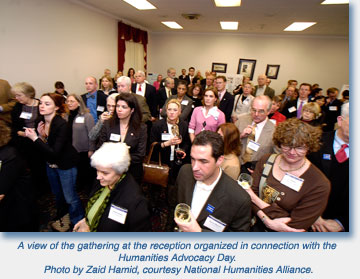 An annual event organized by the National Humanities Alliance to promote awareness of and support for the humanities, the latest Humanities Advocacy Day, held March 1–2, 2006, was sponsored by 32 national humanities organizations (including the American Historical Association and the National Coalition for History), and attracted more than 100 advocates from across the United States.
An annual event organized by the National Humanities Alliance to promote awareness of and support for the humanities, the latest Humanities Advocacy Day, held March 1–2, 2006, was sponsored by 32 national humanities organizations (including the American Historical Association and the National Coalition for History), and attracted more than 100 advocates from across the United States.
The "day" is actually spread over two days because the advocates—many of whom are new to the process—themselves needed to be briefed and trained before proceeding to the important task of interacting with members of Congress and their staffs to make the case for humanities. The first day, therefore, was devoted to preparing for the second day's activities. On March 1, the 110 advocates for the humanities received briefing papers and orientation talks covering topics such as the fiscal 2007 budgets for the National Endowment for the Humanities and the National Historical Publications & Records Commission (an especially crucial topic this year because the NHPRC has been zeroed out in the budget.) The group also enjoyed presentations on effective communication with Congress and about online advocacy. A short video on the NEH, courtesy of the History Channel, was also viewed in celebration of the agency's 40th anniversary.
The training day was rounded off by an evening reception at which a large gathering heard speeches from Representatives James Leach (R-Iowa) and David Price (D-N.C.), the co-chairs of the House Humanities Caucus, and from Bruce Cole, the chair of the NEH. AHA President Linda K. Kerber (University of Iowa), introduced Rep. Leach (see Kerber's reflections on the Advocacy Day). Both Leach and Price spoke of the necessity to support humanities related programs and initiatives. Bruce Cole summarized several of the NEH programs he particularly would like to see funded this year.
The reception, held in the Rayburn House Office Building, also featured an exhibition of some of the many projects that had been funded by the NEH. These included displays of Litgloss, an online collection of annotated texts, undertaken by the University of Buffalo; the NEH Bookshelf, a collection of books that had been supported by the NEH, from the American Association of University Presses; and a project on transit history undertaken by the University of New Orleans.
In meetings with congressional staff and members the next day, participants stressed the importance of the work of the NEH, including its current emphasis on the history-based “We the People” program. Participants voiced concern, however, that while the NEH is flat-funded this year, because of administrative salary and overhead costs the total NEH budget will actually experience a cut in programmatic funds unless Congress grants the agency a higher level of appropriations than is recommended by the president.
In meetings with Treasury/Transportation appropriations staff (committees of jurisdiction for the National Archives budget, including the NHPRC) Humanities Advocacy Day participants were told that "nobody wants to see the NHPRC zeroed out." However, participants were told that this year—even more than last—that funding levels for all agencies, including the NHPRC, will be tight, that there is little room for increases in discretionary programs, and that obtaining funding even in the $5–$8 million range for national grants will prove challenging.
Appropriations staff stressed how important letters from individuals and organizations are in maintaining and increasing the level of Congressional support for the NHPRC. Because there will not be a formal NARA hearing this year where Archivist Allen Weinstein will be permitted to testify and directly articulate his priorities to members of Congress, it was stressed that written statements of support for NARA and the NHPRC should be delivered to the committee by fax or e-mail by the deadline of April 14.
—Compiled from reports by the National Humanities Alliance and by Bruce Craig of the National Coalition for History.
This work is licensed under a Creative Commons Attribution-NonCommercial-NoDerivatives 4.0 International License. Attribution must provide author name, article title, Perspectives on History, date of publication, and a link to this page. This license applies only to the article, not to text or images used here by permission.